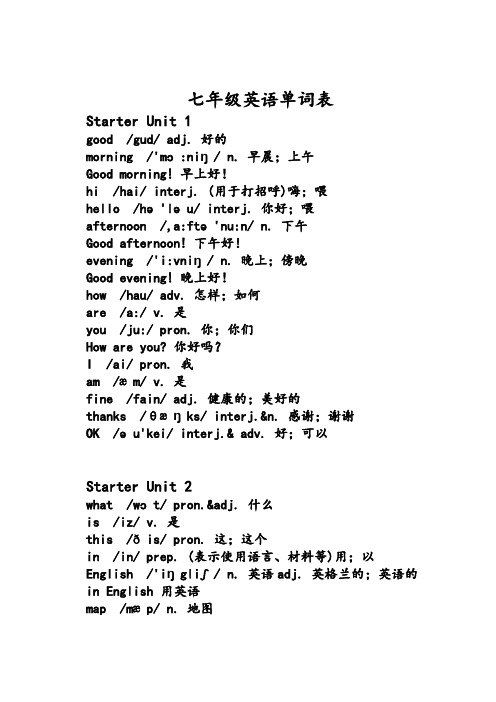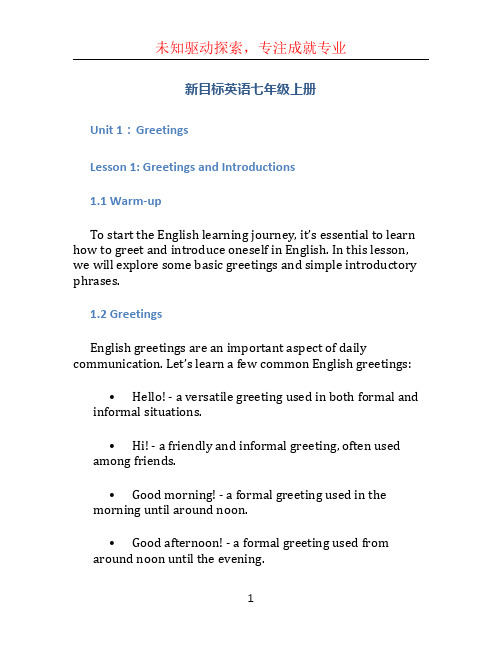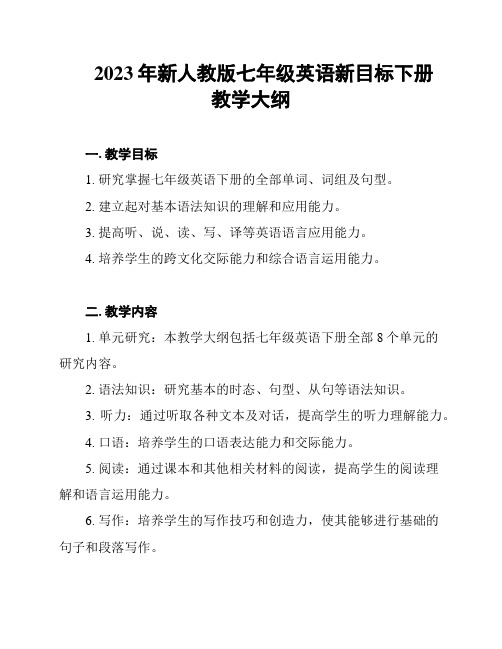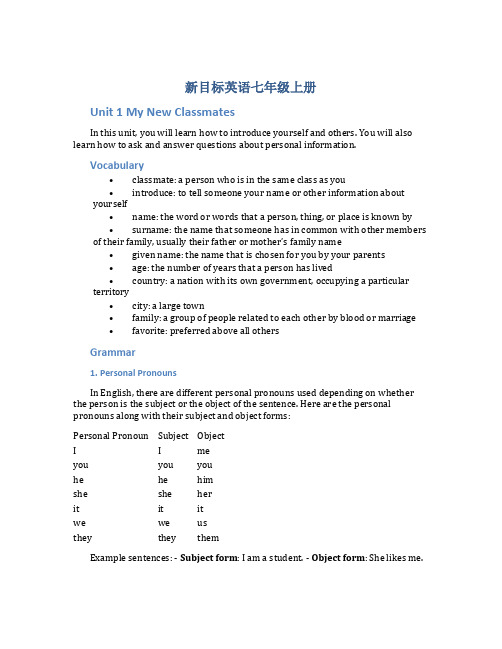新目标英语七年级
新人教新目标七年级上册英语单词表(含音标)

七年级英语单词表Starter Unit 1good /gud/ adj. 好的morning /'mɔ:niŋ/ n. 早晨;上午Good morning! 早上好!hi /hai/ interj. (用于打招呼)嗨;喂hello /hə'ləu/ interj. 你好;喂afternoon /,a:ftə'nu:n/ n. 下午Good afternoon! 下午好!evening /'i:vniŋ/ n. 晚上;傍晚Good evening! 晚上好!how /hau/ adv. 怎样;如何are /a:/ v. 是you /ju:/ pron. 你;你们How are you? 你好吗?I /ai/ pron. 我am /æm/ v. 是fine /fain/ adj. 健康的;美好的thanks /θæŋks/ interj.&n. 感谢;谢谢OK /əu'kei/ interj.& adv. 好;可以Starter Unit 2what /wɔt/ pron.&adj. 什么is /iz/ v. 是this /ðis/ pron. 这;这个in /in/ prep. (表示使用语言、材料等)用;以English /'iŋgliʃ/ n. 英语adj. 英格兰的;英语的in English 用英语map /mæp/ n. 地图cup /kʌp/ n. 杯子ruler /'ru:lə/ n. 尺;直尺pen /pen/ n. 笔;钢笔orange /'ɔrindʒ/ n. 橙子jacket /'dʒækit/ n. 夹克衫;短上衣key /ki:/ n. 钥匙quilt /kwilt/ n. 被子;床罩it /it/ pron. 它a /ə/ art. (用于单数可数名词前)一(人、事、物)that /ðæt/ pron. 那;那个spell /spel/ v. 用字母拼;拼写Starter Unit 3color /'kʌlə/ n. (=colour) 颜色red /red/ adj.& n. 红色(的)yellow /'jeləu/ adj.& n. 黄色(的)green /gri:n/ adj.& n. 绿色(的)blue /blu:/ adj.& n. 蓝色(的)black /blæk/ adj.& n. 黑色(的)white /wait/ adj.& n. 白色(的)purple /'pə:pl/ adj.& n. 紫色(的)brown /braun/ adj.& n. 棕色(的);褐色(的)the /ði; ðə/ art. 指已提到或易领会到的人或事now /nau/ adv. 现在;目前see /si:/ v. 理解;明白can /kæn/ modal v. 能;会say /sei/ v. 说;讲my /mai/ pron. 我的Unit 1name /neim/ n. 名字;名称nice /nais/ adj. 令人愉快的;宜人的to /tu:/ 常用于原形动词之前,该动词为不定式meet /mi:t/ v. 遇见;相逢too /tu:/ adv. 也;又;太your /jɔ:/ pron. 你的;你们的Ms. /miz/ (于女子的姓名前,不指明婚否)女士his /hiz/ pron. 他的and /ænd/ conj. 和;又;而her /hə:/ pron, 她的yes /jes/ interj. 是的;可以she /ʃi:/ pron. 她he /hi:/ pron. 他no /nəu/ interj. 不;没有;不是not /nɔt/ adv. 不;没有one /wʌn/ num. 一two /tu:/ num. 二three /θri:/ num. 三four /fɔ:/ num. 四five /faiv/ num. 五six /siks/ num. 六seven /'sevn/ num. 七eight /eit/ num. 八nine /nain/ num. 九phone /fəun/ n. xx;xx机first /fə:st/ adj. 第一last /la:st/ adj. 最后的;末尾的friend /frend/ n. 朋友China /'tʃainə/ 中国school /sku:l/ n. 学校Unit 2sister /'sistə/ n. 姐;妹mother /'mʌðə/ n. 母亲;妈妈father /'fa:ðə/ n. 父亲;爸爸parent /'peərənt/ n. 父(母)亲brother /'brʌðə/ n. 兄;弟family /'fæməli/ n. 家;家庭who /hu:/ pron. 谁;什么人oh /əu/ interj. 哦;啊they /ðei/ pron. 他(她、它)们well /wel/ interj. 嗯;好吧have /hæv/ v. 经受;经历bye /bai/ interj. (=goodbye)再见son /sʌn/ n. 儿子grandpa /'grænpa:/ n. (外)祖父;爷爷;外公mom /m ɔm/, /ma:m/ n. (=mum)妈妈aunt /a:nt/ n. 姑母;姨母;伯母;婶母;舅母grandma /'grænma:/ n.(外)祖母;奶奶;外婆;dad /dæd/ n. 爸爸photo /'fəutəu/ n. 照片of /ɔv, əv/ prep. 属于(人或物);关于(人或物)next /nekst/ adj.&n. 下一个(的);接下来(的)picture /'piktʃə/ n. 照片;图画girl /gə:l/ n. 女孩dog /dɔg/ n. 狗Unit 3pencil /'pensl/ n. 铅笔book /buk/ n. 书eraser /i'reizə/ n. 橡皮box /bɒks/ n. 箱;盒pencil box 铅笔盒;文具盒schoolbag /'sku:lbæg/ n. 书包dictionary /'dikʃənəri/ n. 词典;字典his /hiz/ pron. 他的mine /main/ pron. 我的hers /hə:z/ pron. 她的excuse /ik'skju:z/ v. 原谅;宽恕me /mi:/ pron. (I的宾格)我excuse me 劳驾;请原谅thank /θæŋk/ v. 感谢;谢谢teacher /'ti:tʃə/ n. 老师;教师about //ə'baut/ prep. 关于What about...?(询问消息或提出建议..怎么样?yours /jɔ:z/ pron. 你的;你们的for /fɔ:/ prep. 为了;给;对thank you for... 为......而感谢help /help/ v.&n. 帮助;援助wele /'welkəm/ adj. 受欢迎的You're wele. 别客气。
新目标英语七年级上册 (2)

新目标英语七年级上册Unit 1:GreetingsLesson 1: Greetings and Introductions1.1 Warm-upTo start the English learning journey, it’s essential to learn how to greet and introduce oneself in English. In this lesson, we will explore some basic greetings and simple introductory phrases.1.2 GreetingsEnglish greetings are an important aspect of daily communication. Let’s learn a few common English greetings:•Hello! - a versatile greeting used in both formal and informal situations.•Hi! - a friendly and informal greeting, often used among friends.•Good morning! - a formal greeting used in the morning until around noon.•Good afternoon! - a formal greeting used from around noon until the evening.•Good evening! - a formal greeting used in the evening and at night.1.3 IntroductionsNext, let’s learn how to introduce ourselves in English. Here’s an example of a basic self-introduction:•A: Hello! My name is Alice. What’s your name?•B: Hi Alice! Nice to meet you. I’m Bob.In English, when introducing oneself, it is essential to include your name and greet the other person. It’s also customary to respond by offering a pleasant response when someone introduces themselves to you.1.4 PracticeTo reinforce the learning, let’s practice greetings and introductions. Role-play different scenarios with your classmates or use the following questions as prompts:•What’s your name?•How old are you?•Where are you from?Remember to use appropriate greetings and polite language during these interactions.1.5 Speaking ChallengeFor the speaking challenge, choose a partner and practice exchanging introductions. Make sure to greet each other and ask questions using the phrases you have learned.Lesson 2: Classroom English2.1 Warm-upIn this lesson, we will learn essential classroom English phrases that will help you communicate effectively with your teachers and peers.2.2 Classroom InstructionsTo ensure smooth classroom activities, teachers often use specific instructions in English. Let’s familiarize ourselves with some common classroom instructions:•Please sit down.•Raise your hand.•Stand up.•Open your book.•Close your book.•Pay attention.•Take out your pen/pencil.•Put away your belongings.2.3 Expressing NeedsWhen you need something in the classroom, it’s important to know how to express your needs. Here are some useful phrases:•Can I borrow a pen, please?•May I go to the restroom?•I need a piece of paper.•Can you help me, please?•I don’t understand.2.4 PracticeTo practice classroom English, engage in role-playing activities with your classmates. Act out different classroom scenarios and use the classroom instructions and phrases you have learned.2.5 Speaking ChallengeFor the speaking challenge, pair up with a classmate and take turns giving instructions or expressing needs. Practice using the phrases from this lesson and respond accordingly.Unit 2: My School LifeLesson 3: Daily Routines3.1 Warm-upIn this lesson, you will learn how to talk about your daily routines in English. Daily routines refer to the regular activities you engage in every day, such as waking up, eating breakfast, going to school, etc.3.2 Talking about Daily RoutinesTo talk about daily routines, we use time expressions and action verbs. Here are some examples:•I wake up at 7 am.•I brush my teeth.•I have breakfast at 7:30 am.•I go to school at 8 am.3.3 Adverbs of FrequencyWhen discussing daily routines, we often mention how frequently we perform certain actions. Adverbs of frequency help us express this. Here are some common adverbs of frequency:•Always•Usually•Often•Sometimes•Rarely•Never3.4 PracticeTo practice talking about daily routines, create a schedule for an average school day. Include the time and actions you typically perform. Share your schedule with a partner and discuss similarities and differences.3.5 Speaking ChallengeFor the speaking challenge, create a dialogue with a classmate where you discuss your daily routines. Incorporate the adverbs of frequency and time expressions into your conversation.Unit 3: My FamilyLesson 4: My Family4.1 Warm-upIn this lesson, we will learn vocabulary related to family members and how to describe them in English.4.2 Family VocabularyLet’s start by learning some common family member vocabulary:•Mother•Father•Sister•Brother•Grandmother•Grandfather•Aunt•Uncle•Cousin4.3 Describing Family MembersOnce you have learned the family member vocabulary, practice describing your family members using simple sentences. For example:•My mother is kind and caring.•My sister is funny and creative.•My grandfather likes to tell stories.4.4 PracticeTo reinforce your understanding and vocabulary, create a family tree. Include the names of your family members and describe their characteristics using adjectives.4.5 Speaking ChallengeFor the speaking challenge, create a presentation about your family. Introduce each family member and describe their personality traits. Use the vocabulary and sentence structures you have learned in this lesson.ConclusionIn this document, we have covered the first three units of the New Target English Grade 7 textbook. These units focused on greetings, classroom English, daily routines, and family vocabulary. By practicing these essential topics, you will be equipped with basic English communication skills that will serve as a foundation for further learning. Keep practicing and exploring the English language!。
2023年新人教版七年级英语新目标下册教学大纲

2023年新人教版七年级英语新目标下册教学大纲一. 教学目标1. 研究掌握七年级英语下册的全部单词、词组及句型。
2. 建立起对基本语法知识的理解和应用能力。
3. 提高听、说、读、写、译等英语语言应用能力。
4. 培养学生的跨文化交际能力和综合语言运用能力。
二. 教学内容1. 单元研究:本教学大纲包括七年级英语下册全部8个单元的研究内容。
2. 语法知识:研究基本的时态、句型、从句等语法知识。
3. 听力:通过听取各种文本及对话,提高学生的听力理解能力。
4. 口语:培养学生的口语表达能力和交际能力。
5. 阅读:通过课本和其他相关材料的阅读,提高学生的阅读理解和语言运用能力。
6. 写作:培养学生的写作技巧和创造力,使其能够进行基础的句子和段落写作。
三. 教学方法1. 组织互动式教学:通过小组合作、角色扮演、情景训练等方式激发学生的参与和积极性。
2. 情境教学法:通过设置真实的语言环境和情境,提高学生的研究兴趣和应用能力。
3. 多媒体教学:利用多媒体技术,丰富教学内容,提高学生的研究效果和记忆力。
四. 教学评价1. 综合评价:综合考察学生在听、说、读、写、译等方面的表现,通过各种测试形式进行评价。
2. 个性化评价:根据学生的不同需求和特点,给予个体化的评价和辅导。
五. 教学资源1. 教材:新人教版七年级英语新目标下册。
2. 多媒体设备:计算机、投影仪等。
3. 音频材料:相关录音、音乐等。
六. 教学安排1. 按照教材的顺序,每周安排一到两个单元的研究。
2. 每节课根据学生的实际情况,合理安排听、说、读、写等活动。
3. 重点讲解语法知识,并进行相关的练和应用。
以上是《2023年新人教版七年级英语新目标下册教学大纲》的基本框架,根据实际情况和教学需求,可以进行适当的调整和补充。
人教版新目标七年级英语上册Unit 7讲义及重点总结

新目标七年级上册Unit7讲义Unit7目标:1.会问价格;2. 谈论衣物;3. 提供帮助; 4. 感谢某人四、词汇讲解及拓展1. 成双成对的词【☆☆】由两部分组成的物品常以复数的形式出现,如:socks,shoes,trousers ,clothes (1)这些物品作主语时,谓语动词一般用复数形式:How much are the socks? 袜子多少钱?(2)若要表示一双,一副,一条”时,可用a pair of , 这时谓语动词用单数。
This pair of socks is $18.【例题】1. Bob’s ______ and ______ are on the sofa.A. trouser; shortB. trousers; shortC. trousers; shortsD.trouser; shorts2. This pair of shorts ______ Eric’s.A. amB. isC. areD.be2. How much is this T-shirt? 这件T恤多少钱?【☆☆☆】How much 用来询问价格,意为:“多少钱”结构:How much is + 单数可数名词/ 不可数名词? 回答:It’s + 价格.How much are + 可数名词复数? 回答:They are + 价格.E.g. ---- How much is this sweater? ---- It’s twenty-one dollars. 这件毛衣多少钱?它21美元。
----How much the shoes? ---- They are twenty-five dollars. 这双鞋多少钱?它们25美元。
【例题】1. —How much is your skirt? —______ 50 yuan.A. I’mB. You’reC. They’reD. It’s2. 这个书包多少钱?它9美元。
新目标英语七年级上册

新目标英语七年级上册Unit 1 My New ClassmatesIn this unit, you will learn how to introduce yourself and others. You will also learn how to ask and answer questions about personal information.Vocabulary•classmate: a person who is in the same class as you•introduce: to tell someone your name or other information about yourself•name: the word or words that a person, thing, or place is known by•surname: the name that someone has in common with other members of their family, usually their father or mother’s fa mily name•given name: the name that is chosen for you by your parents•age: the number of years that a person has lived•country: a nation with its own government, occupying a particular territory•city: a large town•family: a group of people related to each other by blood or marriage•favorite: preferred above all othersGrammar1. Personal PronounsIn English, there are different personal pronouns used depending on whether the person is the subject or the object of the sentence. Here are the personal pronouns along with their subject and object forms:Personal Pronoun Subject ObjectI I meyou you youhe he himshe she herit it itwe we usthey they themExample sentences: - Subject form: I am a student. - Object form: She likes me.2. Verb。
Unit+1Section+A2023-2024学年人教新目标+Go+For+It+!七年级英语下册

Unit 1 Can you play the guitar Section A基础巩固练2024学年人教新目标Go For It !七年级下册一、英汉互译1.play chess 2.说英语3.tell stories 4.be good at doing sth.5.弹吉他6.跟……说7.打篮球8.do kung fu9.放学后10.show sb. sth.二、单词拼写11.I want to (加入)the music club.12.They can (游泳), but we can’t.13.He’s very good at telling (故事).14.She can't (画画), so she can't join the art club.15.I want to join the music c .16.She can s English very well.17.Can you play c ?18.Can he s this song?19.Can you d with me?20.Do you like (play)ping-pong?21.—Do you want (play)ping-pong with us? —Yes, I do.22.—I like to play basketball and soccer. —You can join a (sport)club.23.— Can you (draw)? — Sorry, I can’t.24.There is(有)a (swim)club in our school.25.The girl can play the (吉他).26.Mike can d pictures very well. He often does it after school.27.Anna is from the USA.She can s English.28.The singer is good at playing the (吉他) and making wonderful music.29.Gina can (唱) English songs.31.Our English teacher often tells us (story) in his class.32.There are some clubs in our school, like English club, (swim) club, etc. 33.Mo Yan is good at (write) novels (小说).34.—What about (play) chess with me?—OK.35.Cindy (show) her family photos to me.三、用括号中所给单词的适当形式填空36.—Do you want (play)pingpong with us?—Yes,I do.37.—Can you (dance)?—Sorry,I can't.38.There is(有) (swim)club in our school.39.—I like to play the violin.—You can (join)a music club.40.Do you like (watch)basketball games?41.Tom wants to join a (sport)club.42.Mary is good at (tell)stories.43.Let's (join)the English club.四、单项选择44.— _______ club do you want to join, Andrew?—I want to join the chess club.A.How B.What C.When D.Who 45.—Can you play volleyball?—Sorry, I _________ .A.don’t B.doesn’t C.can’t D.isn’t46.I can play _________ volleyball but I can’t play _________ guitar.A.a; the B.a; a C.the; the D./; the47.My grandma often _________ funny stories at night.A.talks B.tells C.speaks D.says 48.—Can you sing _________ dance?—I can sing.A.and B.or C.because D.but 49.—Are they good at _________ ?—Yes, they are.50.I like stories so I want to join the _________ .A.art club B.chess club C.story telling club D.telling story club 51.—Can your brother _________ ?—Yes, he loves English songs very much.A.swim B.dance C.sing D.draw 52.Mike can _________ very well.A.swim B.swims C.to swim D.swimming 53.—What can you do, Wang Jian?—_________A.I like sports very much.B.I want to join the music club.C.I can tell stories very well.D.I want to play soccer after school. 54.Bill can play basketball. And he also can play violin.A.a; the B.the; the C./; the D.the; / 55.— I go to Lucy’s birthday party on Sunday, mum?—Yes, you .A.Must; can B.Do; do C.May; can D.Can; need 56.If you want to dance, you can join the .A.music club B.English club C.chess club D.dancing club 57.club do you want to join?A.How B.Where C.What D.When 58.—Can you speak French?— No, I .A.don’t B.can’t C.can D.am not 59.— ________ club do you want to ________?—The sports club.A.What; haveB.What’s; joinC.What; joinD.What’s; have60.I can’t sing________dance,but I can swim________skate.A.and,and B.or,and C.and,or D.or,or61.Oh, it ________so nice. What beautiful music it is !A.smells B.sounds C.tastes D.looks 62.—Can you see the bird?—No,________.A.I don’t B.I’m not C.I can’t D.I can 63.—What can you do,Li Tao?—______.A.I like sports B.I want to join the music club C.I am well D.I can do Chinese Kung Fu 64.I always tell my students on the road because it’s really dangerous.A.not to play B.to play not C.not playing D.not play 65.What does your sister like,music,art ________ sports?A.and B.or C.but D./66.Jim paints well, and he can join the ________ club.A.music B.art C.chess D.P.E.五、按要求完成句子67.比尔会写故事。
人教新目标七年级英语上册Unit7必背词组与句子
人教新目标七年级英语上册Unit7必背词组与句子一.词组1.多少钱 how much(对价格提问)多少面包 how much (bread)(对不可数名词前数量提问)2.多少(书籍) how many (books)(对可数名词前数量提问)3. 许多鸡肉 much chicken许多商店 many stores许多衣服 many clothes4.this pair of socks these socks⎧⎨ ⎩这双短袜 5.对男孩子/女孩来说 for boys/girls6.两条裤子 two pairs of trousers/pants7.一条蓝色连衣裙 a purple skirt8.美元 twenty dollars/$209.45元 forty-five yuan/¥4510.一位女教师 a woman teacher两位女孩师 two women teachers11.一位男教师 a man teacher两位男教师 two men teachers12.需要某物need sth需要做某事need to do sth需要某人做某事need sb to do sth13.看上去漂亮look nice看上去相同look the same看这幅图画look at this picture寻找look for照顾、照看look after14.把某人或某物带到某地去take sb/sth to sp把某物带给某人take sth to sb15.二十一twenty-one16.二十九twenty-nine17.一百a/one hundred18.900 nine hundred19.235 tow hundred and thirty-five20.109 one hundred and nine21.hundreds of +npl(名词复数)数以百计的/成百上千的/好几百的22.史密斯先生Mr.Smith23.在水果店in the fruit store/shop24.许多衣服 many clothes25.buy sth for sb buy sb sth⎧⎨ ⎩给某人买某物 从某地买某物 buy sth from sp26.sell sth to sb sell sb sth ⎧⎨ ⎩把某物卖给某人 27.买某物花……钱buy sth for +价钱卖某物……钱 see sth for +价钱28.在打折、在降价、在甩卖 on sale/ at a great sale29.待售、供销售 for sale30.所有的水果 all the fruit所有妇女 all the women我所有的裙子 all my skirts31.很/非常无聊 very boringvery nice 非常/很漂亮32.非常想要一条牛仔裤 want a pair of jeans very much33.非常喜欢那双鞋子 like those shoes/that pair of shoes very much34.……的价格 the price o f …35.一条白色的裤子 a pair of white trousers/pants36.两美元卖一双 two dollars for one pair37.那些黑色的长裤 those long black trousers一件短的红T 恤 a short red T-sirt一顶黑色的小帽子 a small black hat38.一件上学穿的毛衣 a sweater for school39.有紫色的裙子仅10美元 have skirts in purple/have purple skirts for only $10.40.以很优惠的价格 at very good pricesat a very good/great price41.以高/低价at a high/low price二.句子1./?/??Can May I help you What can I do for you Is these anything I can do for you ⎧⎪ ⎨⎪ ⎩要我帮忙吗?我能为你做些什么吗? 肯定回答: Yes,please,I want/need/I ’d like...是的、我想要......否定回答: No,thanks, 不谢谢2.Here you are Here it is ⎫⎬ ⎭给你 3.I ’ll take it/them.我买下了4.How about this one? It looks nice.这个怎么样啊?它看上去很漂亮5.What color do you want/need?你想要什么颜色?e and buy your clothes at our great sale. 快来买衣服、我们大包卖.7.?cos?'?How much is this shirtHow much does this shirt t TWhat s the price of this T shirtT-⎫⎪T- ⎬⎪-⎭这件恤多少钱?It is ninety-nine dollars. 99美元8.?cos?'.'?'.How much are those black trousersHow much do those black trousers tTher re sixty five yuanWhat s the price of those black brousersIt s sixty five yuan⎫⎪⎪⎪-⎬⎪⎪⎪-⎭那条黑色的裤子多少钱?65元9.How much is this pair of black trousers?这条黑裤多少钱?It’s seventy-eight dollars. 78美元10.Do you need/want/like bags?你需要/想要/喜欢包?11.For boys,we have black trousers for only $ 22. 对男孩来说,我们有黑色裤子仅22美元.12.We sell shorts in all colors for only 12 dollars.我们卖各种颜色的短裤仅12美元.13.We have men’s hats in brown,white and black.They are 10 dollars.我们有棕色的、白色的和黑色的男式帽子,它们10美元14.We sell all our clothes at very good prices.我们所有的衣服都以非常优惠价格出售.15.We have good great women’s shorts for only 25 yuan.我们有上等的女式短裤仅只25元.16.All our clothes are on sale./at a great sale.我们所有的衣服都在打折.17.Socks are only $ 2 for three pairs.袜子三双仅2美元e to our store now!现在就来我们店吧!(现在就行动吧!)。
人教新目标七年级英语上册《句型转换》专项练习题(含答案)
人教新目标七年级英语上册《句型转换》专项练习题(含答案)1.Where is your computer game?2.Is his book on the table。
No。
it isn't.3.Can you see the ball under the chair?4.XXX.5.They are on the dressers.6.XXX.7.Why does she like art?8.My favorite color is yellow.9.What is interesting about the first day of school?10.How about you?11.His favorite subject at school is P.E.12.What subjects are you taking today?13.I don't think history is interesting.14.These are her brothers.15.That is my book.16.Yes。
he is my XXX.17.Are these your friends?18.Who is she?19.How can I assist you?20.She has red skirts.21.How much is the skirt?22.What is the cost of your new schoolbag?23.What color is this skirt?24.How old is he?25.No。
I am not.26.Where is Lucy from?27.XXX?28.Is she in Grade Seven?29.Where is your computer game?30.Is his book on the table。
《新目标英语》七年级(上)
《新目标英语》七年级(上)一、教材分析本节课围绕“Movies”开展教学活动,学习动词want的一般现在时用法。
教师在向学生介绍电影类型的基础上,对学生的电影爱好进行提问:“What kind of movies do you like?”鼓励学生运用所学的语言与同学进行交流,通过谈论电影来进一步表达自己的喜好,并能用want来阐述自己的周末计划。
二、学情分析学生已经学习并掌握了like一词的一般疑问句用法及其简略回答,可以利用该句型来表达自己的喜好。
三、教学目标1.语言技能目标(1)能够谈论自己和别人的爱好。
例如:I like thrillers. He / She likes action movies.(2)能够询问他人的爱好。
例如:What kind of movies do you like?(3)能够用句型:I want to ...来阐述自己的周末计划。
2.语言知识目标(1)掌握在一般现在时中want的一般疑问句及其简略回答。
例如:—Do you want to go to a movie? — Yes, I do. / No, I don't. — Does he / she want to go to a movie? — Yes, he / she does. (No, he / she doesn't.)(2)掌握不同电影类型的名称及其单复数形式。
如:comedy —comedies, thriller —thrillers, action movie —action movies, documentary —documentaries ...(3)正确运用表达意愿的句型。
如:I want to ...3.情感态度目标(1)询问同学对电影种类的爱好及周末计划可以促进学生间相互了解,培养他们互相关心的良好情感。
(2)与朋友交流对电影的看法,有利于培养学生健康的审美情趣。
人教版新目标英语(Go For It)七年级下册单词完整版笔记
hallway ['hɔːlweɪ] n.走廊;过道
hall [hɔːl]n.大厅;礼堂
dining hall餐厅
listen ['lɪs(ə)n]v.听;倾听
listen to…听…… 【listen to music 听音乐】
fight [faɪt]v. & n.打架;战斗
【fight with sb. 和某人打架 fight the fire 救火】
【an important test 一次重要的考试】 bring [brɪŋ]v.带来;取来 【反义词:take v.带走】 uniform ['juːnɪfɔːm]n.校服;制服 quiet ['kwaɪət]adj.安静的【be quiet 保持安静】 out [aʊt]adv.外出 go out 外出(娱乐) practice ['præktɪs]v. & n.练习【practice doing sth. 练习做某事】 dish [dɪʃ]n.碟;盘 do the dishes清洗餐具
小叶学英语
boat [bəʊt] n.小船 ropeway ['rəʊpweɪ] n.索道 year [jɪə] [ jɜː] n.年;岁 afraid [ə'freɪd] adj.害怕;惧怕【be afraid of sth. 害怕某物】 like [laɪk] prep.像; leave [liːv] v.离开 dream [driːm] n.梦想;睡梦 v.做梦 true [truː] adj.真的;符合事实的 【truth n.真相】 come true实现;成为现实 Dave[deiv] 戴夫(男名)
sorry ['sɒrɪ]adj.抱歉的;难过的;惋惜的
- 1、下载文档前请自行甄别文档内容的完整性,平台不提供额外的编辑、内容补充、找答案等附加服务。
- 2、"仅部分预览"的文档,不可在线预览部分如存在完整性等问题,可反馈申请退款(可完整预览的文档不适用该条件!)。
- 3、如文档侵犯您的权益,请联系客服反馈,我们会尽快为您处理(人工客服工作时间:9:00-18:30)。
新目标英语七年级(上)Unit1测试题My name’s Gina.新目标英语七年级(上)Unit1测试题(My name’s Gina)一,翻译:1. telephone number___________ 2 .Susan的名字_____________3. my name ____________4.她叫什么名?_________5. family name___________6.Mike的电话号码是多少?_____________7. Nice to meet you!____________ 8 .下午好!_____________9 .first name_____________ 10.身份证______二,用am , is, are 填空:1. -Hi, I _______ Bob , what _______ your name? -My name _______ Li mei.2. Hello! How ________ you? I ______ fine, thank you.3. -What ______ your telephone number? -It ________ 555-80.4. --What _______ this in English? --It’s a telephone.5. _____ her first name Gina?三,按要求写出相应形式:1. what is ________________(缩写形式)2. I am _________________(缩写形式)3. her name is _____________(缩写形式)4. it is _________________(缩写形式)5. is not _________________(缩写形式)6. are not _______________(缩写形式)7. they are _______________ (缩写形式) 8. Jim is________________(缩写形式)四,用所给的代词的适当形式填空:1.______(us) love ______(we) country and we’ll make it more beautiful.2._________(his) studies in a middle school near __________(he) home.3.-----Is it _________(you), Tom? ----- No, it isn’t. It must be ________(they) book.4.I think _________(we) teacher is young than _________(they).5.She is my sister. _______ (she)name is Lucy. You can call_______ (she)Kate.6. It is _____(I) eraser. Please give it to_______(I).7. Please give ___ (we)the books. They’re _______(we)books.8.----What’s ______(he)name?”---- ______(he)name is Zhang ling.And you can call _______(he)Mr. Zhang.”五,单选题:1. ---______________your name, please? --- _______________ name is Gina Smith.A. What, IB. What’s, YourC. What’s, MyD. What, My2. Her name is Ann Read. Read is her _____________________ name.A. firstB. givenC. fullD. family3. My English teacher’s name is Bruce White. So we all call him ___________.A. Miss BruceB. Mr. BruceC. Mr. WhiteD. Sir Bruce.4. --- I’m ______________ to be late today. --- That’s all right.A. fineB. rightC. sorryD. nice5. --- Good morning, Miss Gao. --- _______________________ Li Ming.A. Nice to meet youB. HelloC. How do you doD. Good morning6.–What’s this? -- It is ___________.A. an ID cardB. a orangeC. rulerD. an UFO7.This is __________ jacket.A. blue meB. my blueC. blue myD. the my blue8. A: What's your name? B: My name is______ .A. Wang XiaomeiB. Wang xiao meiC. Wang Xiao MeiD. Wang xiaomei9.Kate Green is a girl. Kate is the , Green is the .A. first name, last nameB. last name, first nameC. full name, family nameD. family name, first name10. --- Sit down, please. --- ________________________.A. Thank youB. Yes, you’re right.C. OKD. All right11. --- Excuse me. __________________ you Mr. Zhang?--- Yes, my name _________________ Zhang Ming.A. Are, amB. Is, areC. Is, amD. Are, is12. Hello, Kay, _________________ my friend, Helen.A. It’sB. This’sC. She’sD. This is13. --- __________________________, Gina. --- Nice to meet you, too, Li Lei.A. Good morningB. How are youC. Nice to meet youD. Thank you14. --- This is Jim, Gina. --- ____________________, Jim.A. Good morningB. Nice to meet youC. How are youD. This is15. --- ___________________ his name ? --- He’s Mike, my friend.A. WhatB. What’sC. WhoD. Who’s16. Chinese names don’t have _____________________ names.A. givenB. middleC. lastD. family17. 在上学的路上,你遇见你的同学Gina时,你应说:A. Good morning, Gina.B. Hello, this is Gina.C. What’s your name, Gina?D. Good night, Gina.18. 当你想知道某东西用英语怎么说时,你应这样问:A. Is this in English?B. It’s English.C. What’s this in English?D. This is English.19.当别人对你说:“Sit down, please.(请坐。
)”时,你应该说__________.A SorryB Good morningC HiD Thank you20. You want to know Mary’s mobile phone number. You ask her:A. Is this your mobile phone?B. This is your mobile phone number.C. What’s your mobile phone number?D. Your mo bile phone number is what六,补全对话:A: Good afternoon.B: Good 1A: What's ___2____ ___3____?B: I 4 Li Xin. My 5 name is Li , my 6 name is.Xin.And ___7___ ___8___ ___9___? A: My name 10 Jim Green. 11 are you?B: Fine, 12 you. How are you?A: I'm 13 .What's ___14____ 15 number?B:____16___ 281-9176.七,句型转换:1,My name is Amy.(就划线部分提问)______________ ______________ _______________name, please?2. My telephone number is 298-3026. (就划线部分提问)______________ ______________ telephone number, please?3. I’m Z hang Xiaoming. (变为一般疑问句并按实际回答)_____________ ____________ Zhang Xiaoming? _________ _________ _________ ________.4,We are from America.(变为否定句)______ ______ ______ ______ ________.5,He is Bob.(同义句转换)______ ______ _______ _______.6, Bob, his, English, is, name(连词成句)__________________________________________________________.7. she, her, is, what, ?, Lucy, name , is.(连词成句)_______________________________________________________________________. 8. is, telephone, what, number, it, your, ?, is, 298-5197. (连词成句)_______________________________________________________________________. 八,完成句子:1. 你的电话号码是多少?___________ __________ ____________ ____________?2. 他叫什么名字?____________ __________ name?3. 这是我的妹妹。
